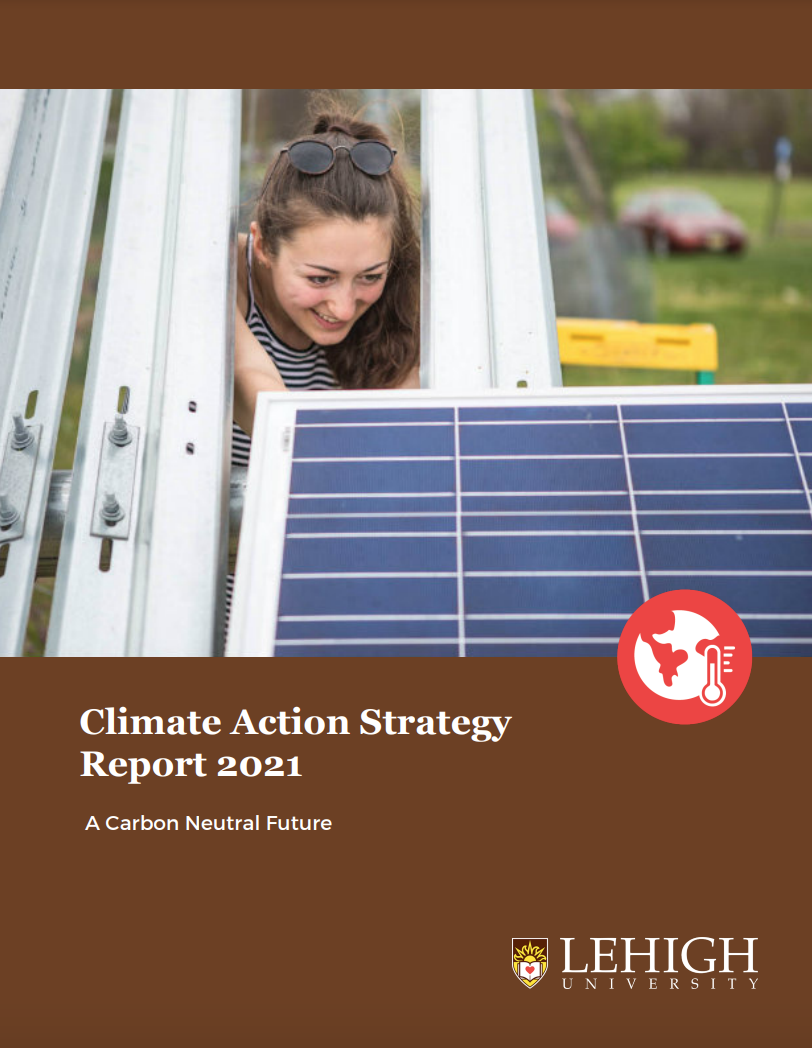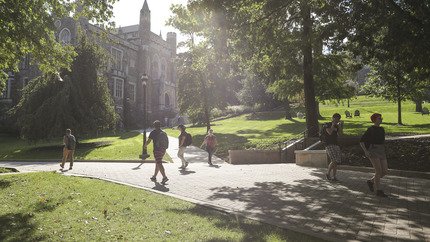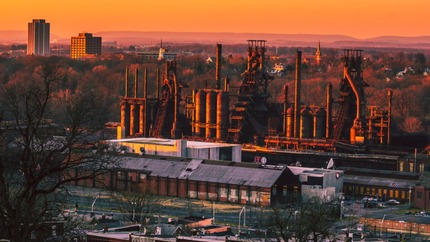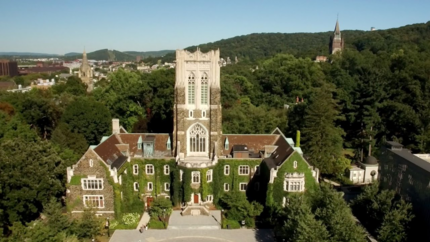
The strategy establishes a 'Pathway to Zero' emissions to positively impact Lehigh's bottom line and achieve net carbon neutrality by 2040.
 Climate Action Strategy
Climate Action Strategy
A key component of Lehigh’s Sustainability Strategic Plan 2030 (2030 Plan) is the development and implementation of a Climate Action Strategy (CAS). Lehigh’s Climate Action Strategy provides a comprehensive roadmap for achieving the largest and most cost effective emissions reductions.
The City of Bethlehem completed a Climate Action Plan in 2021. It includes a net-zero by 2040 community-wide GHG emissions reduction target and a net-zero by 2030 municipal operations target. Lehigh University's Climate Action Strategy aligns with many of its peer and aspirational peer institutions and it also aligns the university with the City of Bethlehem's plan.
Click on the image to the left to view a PDF of the plan or scroll down to view the plan in HTML format.
The development of Lehigh’s Climate Action Strategy placed a significant focus on engagement with the university’s stakeholders including students, faculty, staff, alumni, planners, leaders in the Lehigh Valley and other higher education sustainability leaders. Through a series of campus ideation sessions and surveys, the campus community provided input and guidance as to what should be evaluated in the CAS.
Additionally, four working groups, an internal advisory group and an external advisory group all contributed to the development of projects, initiatives and strategies. Going forward, an Executive Committee will be leading the implementation of the emissions reduction strategies.
Lehigh’s Climate Action Strategy identifies a ‘Pathway to Zero’ emissions for Lehigh to achieve net carbon neutrality by 2040 by pursuing nine categories of emissions reduction strategies. Several initiatives are already underway. The intermediate anticipated emissions reduction targets are a 60% reduction in gross emissions by 2025 and an 80% reduction by 2030. All emissions reduction targets are compared to Lehigh’s emissions base year, which is calendar year 2007. The most impactful initiative, from an emissions reduction perspective, is the pursuit of a solar Virtual Power Purchase Agreement (VPPA) that will mitigate 90% of Lehigh’s current electric emissions. Completion of High Priority Energy Projects will provide the most operational savings of any initiative, providing $14.7 million in savings through 2040. In total, incremental new investments to support the Climate Action Strategy are estimated at $12-$26 million and are estimated to result in a total of more than $29 million in operational savings on campus through 2040.
Universities have a responsibility to build a better global future and, like many other higher education institutions, Lehigh University recognizes the need to responsibly lead by example through actions that reduce GHG emissions resulting from campus operations. Implementing emissions reduction strategies is also an increasingly important issue to incoming and current students, faculty, staff and alumni and it fits squarely within the academic mission and research focus areas of the university. As a premier academic institution, Lehigh is uniquely positioned to make significant contributions to address climate change. Lehigh is furthering its commitment to climate action with the release of this Climate Action Strategy.
In 2009, Lehigh drafted and signed a university Climate Commitment, which vowed to create institutional policies and procedures to protect and improve the environment. In October 2020, Lehigh released its Sustainability Strategic Plan 2030, which establishes a long-term vision for sustainability at Lehigh. A key component of the 2030 Plan is the development of this Climate Action Strategy to establish a set of carbon mitigation actions to reach net carbon neutrality by 2040. To develop this Climate Action Strategy, Lehigh partnered with The Stone House Group (SHG) and Trust to map out a 'Pathway to Zero' emissions for Lehigh to achieve net carbon neutrality by 2040. The Climate Action Strategy prioritizes: reducing greenhouse gas emissions, improving energy efficiency, offsetting electricity consumption with renewable energy and transitioning to cleaner transportation options. Throughout the CAS development process, SHG provided technical support in conducting peer analysis, identifying and evaluating carbon mitigating projects and designing pathways toward achieving the goals set forth in the 2030 Plan, while Trust provided communication, facilitation and engagement support.
The Stone House Group worked with a variety of campus stakeholders through a comprehensive and engaging process that centered around working groups that were selected to target Lehigh’s largest sources of campus GHG emissions: Building Energy, Transportation and Commuting, and Procurement (Air Travel and Paper). Additionally, a Carbon Offsets working group was established to explore how and when it would be useful for Lehigh to utilize offsets. An External Advisory Group composed of alumni, local leaders and other higher education sustainability professionals provided guidance formed through their experiences, and an Internal Advisory Group composed of faculty, staff and students provided leadership from an internal perspective. Additionally, Trust supported a series of campus ideation sessions and surveys which created space for all faculty, staff, students and alumni to learn, ask and engage in Lehigh’s Climate Action Strategy development process. Input from the campus community was a critical part of the development process and was key to establishing the guiding principles used throughout the strategy development.
Lehigh’s 'Pathway to Zero' emissions will achieve net carbon neutrality by 2040 through the pursuit of several emissions reduction strategies. By implementing the emissions reduction strategies, Lehigh anticipates a 60% reduction in emissions by 2025, 80% reduction by 2030 and carbon neutrality by 2040. While the 'Pathway to Zero' emissions establishes a plan for Lehigh to achieve significant emissions reductions by 2030, Lehigh would continue to improve upon emissions reductions between 2030 and 2040 and would begin the thoughtful purchase of RECs and carbon offsets between 2035 and 2040. Based on a thorough evaluation of the emissions reduction strategies, it is estimated $12-26 million (using 2021 dollars) in incremental new investments will be required through 2040 to achieve the net carbon neutrality goal. Between 2022 and 2040, Climate Action Strategy initiatives are estimated to produce a total of more than $29 million in operational savings on campus. Some of the projects are already underway. Implementation of the other projects will begin in FY 22 and will occur in phases upon release of the strategy.
With the development and release of this Climate Action Strategy, Lehigh is charting a course to reduce the environmental impacts of campus operations over the next 15 to 20 years. Establishing a carbon neutrality date of 2040 will require an enhanced campus-wide commitment to sustainability. To ensure Lehigh’s climate action goals are met, a Climate Action Strategy Executive Committee has been formed and is responsible for achieving Lehigh’s GHG reduction targets. Many of the emissions reduction strategies, such as the VPPA and on-site solar projects, are already in progress. Implementation plans and tactics will continue to be developed through the Executive Committee’s efforts. This will allow Lehigh to continue building on the momentum established during the Climate Action Strategy development process. An annual progress update will be provided to senior leadership.
The Lehigh University Office of Sustainability would like to recognize and thank The Stone House Group and Trust for their contributions to the Climate Acton Strategy.
The Office of Sustainability would also like to recognize and thank the individuals who served on the advisory groups and working groups for their input and expertise in shaping Lehigh's strategy.
Advisory Groups
Internal
- Al Wurth, Faculty, College of Arts & Sciences
- Benjamin Davis, LSC Graduate Student Rep
- Brent Stringfellow, Associate VP of LU Facilities and University Architect
- Emily Randolph, LSC Undergraduate Rep
- Henry Odi, Deputy VP for Equity and Community and Associate Provost for Academic Diversity, and Adjunct Professor
- Karen Pooley, Professor of Practice, College of Arts & Sciences
- Mark Ironside, Assistant VP of Business Services, President, LU Properties, LLC
External
- Aurora Winslade, Swarthmore College
- Dan Zarrilli, Lehigh Alum
- Darlene Heller, City of Bethlehem
- Geoff Reese, Lehigh Valley Planning Commission
- Jesse Lytle, Haverford College
- Lynn Rothman, Bethlehem Environmental Advisory Council
- Matt Tuerk, Lehigh Valley Economic Development Corporation
- Sue Rockwell, Lehigh Valley Planning Commission
- Victoria Herrmann, Lehigh Alum
Working Groups
Transportation and Commuting
*Sharon Field, Director, Transportation and Parking Services
- Arindam Banjeree, Faculty, College of Engineering
- Bob Bruneio, Manager, Transportation Services
- Kaja Skerlj, Undergraduate Student
- Lexy Tracy, Undergraduate Student
- Rudy Shankar, Director, Energy Systems Engineering
Procurement: Air Travel and Paper
*Jane Altemose, Director, Purchasing Services
- Brenda Bachman, Coordinator, OneCard & Travel
- Cindy Hart, Executive Secretary to the Provost, Provost's Office
- Doug Snyder, Campus Manager, Ricoh Services
- Jesse Pearson, Director, Library and Technology Services
- Jodeen Gemmel, Study Abroad
- Katie Radande, Study Abroad
Building Energy
*Don Pasda, Director, Building and Utility Systems
- Alex Radus, Assistant General Counsel
- Alparslan Oztekin, Lehigh Industrial Assessment Center
- Alyssa Klinger, Undergraduate Student
- Doug Spengel, Associate Director, Utilities and Engineering
- Jason Gall, Associate Director, Athletics Facilities and Events
- Logan Whitall, Undergraduate Student
- Ozzie Breiner, Director, Housing Services
- Phil Coles, Professor of Practice, College of Business
- Steve Schlegel, Energy Conservation Engineer
Carbon Offsets
*Doug Spengel, Associate Director, Utilities and Engineering
- Alberto Lamadrid, Faculty, College of Business
- Benjamin Felzer, Faculty, College of Arts & Sciences
- Erin Kintzer, Director, Real Estate Services
- Nick Rose, Program Coordinator, Purchasing Systems
- Will Yaeger, Undergraduate Student







